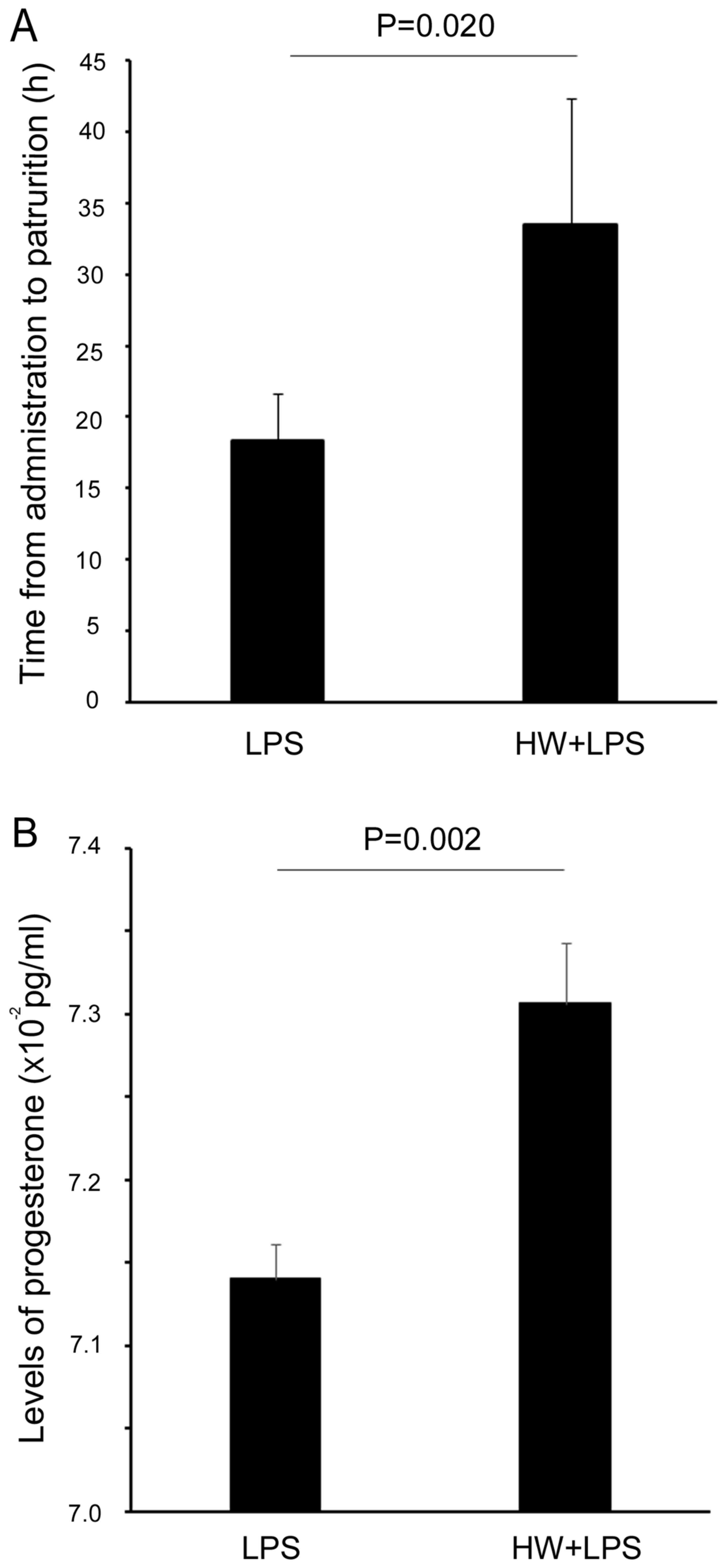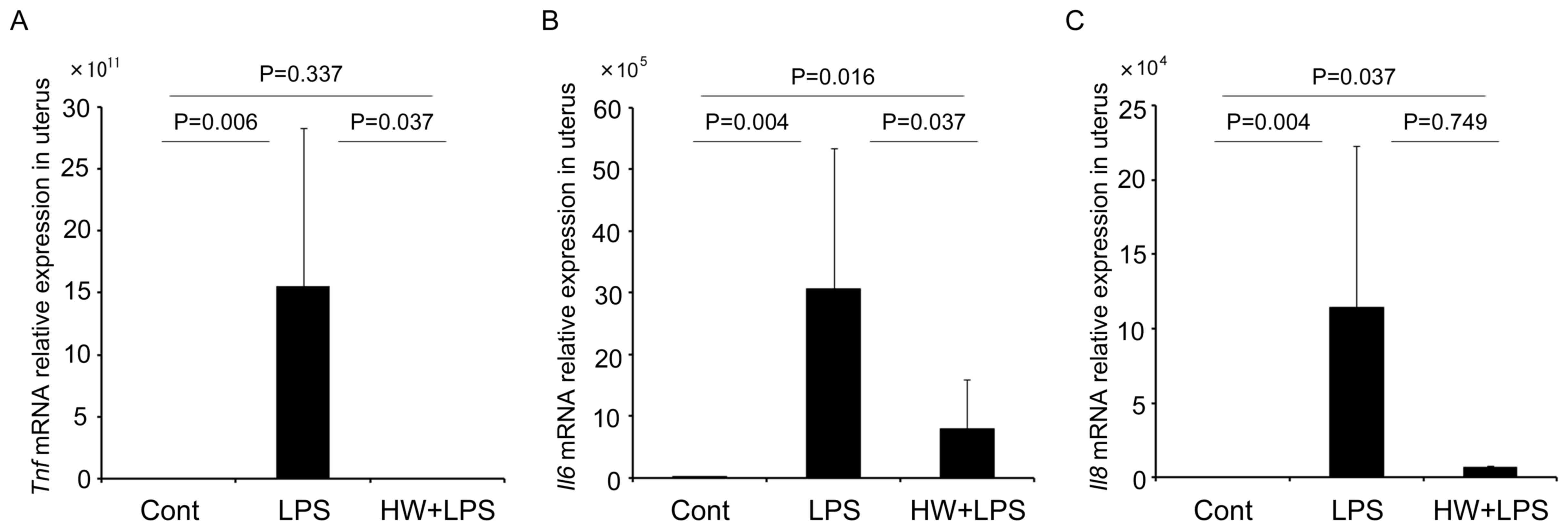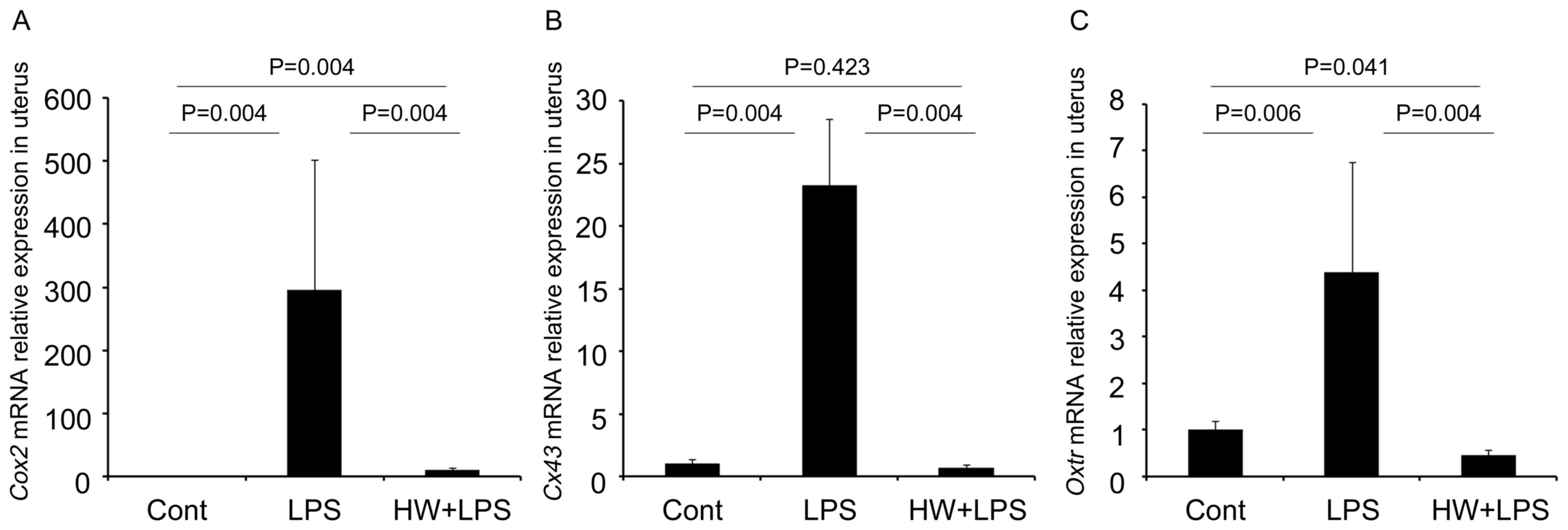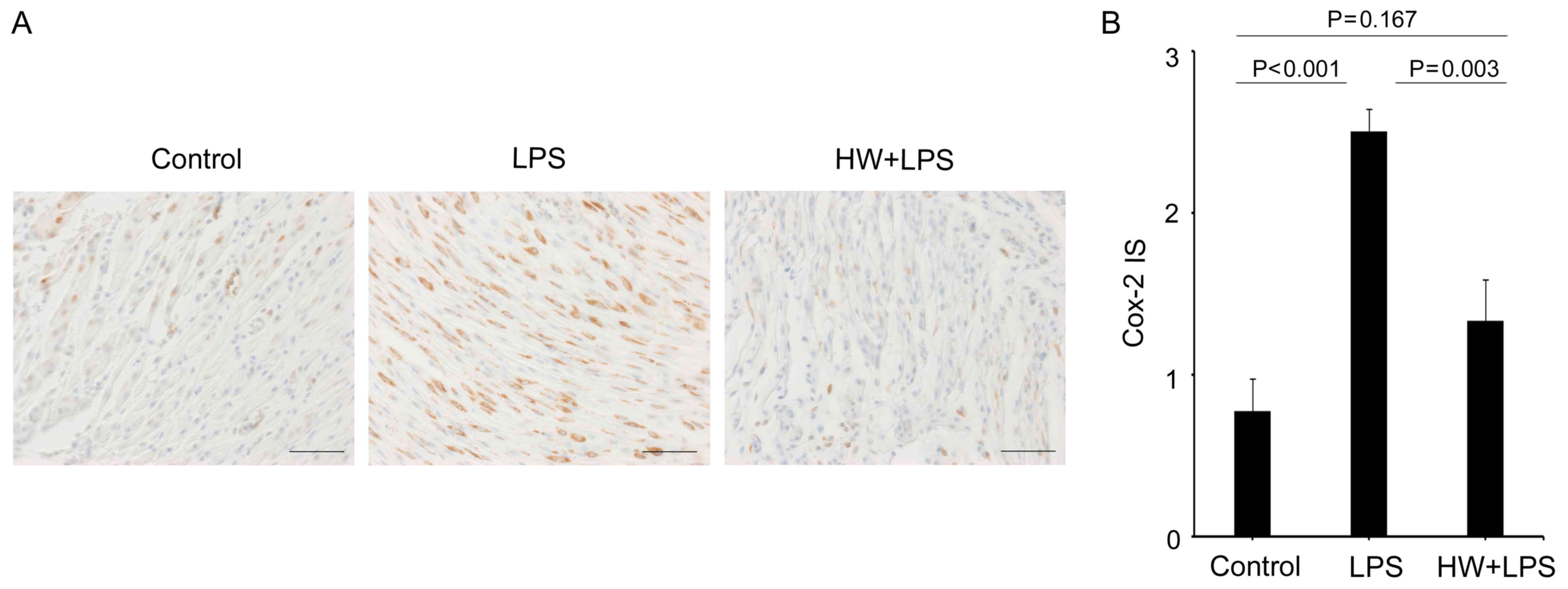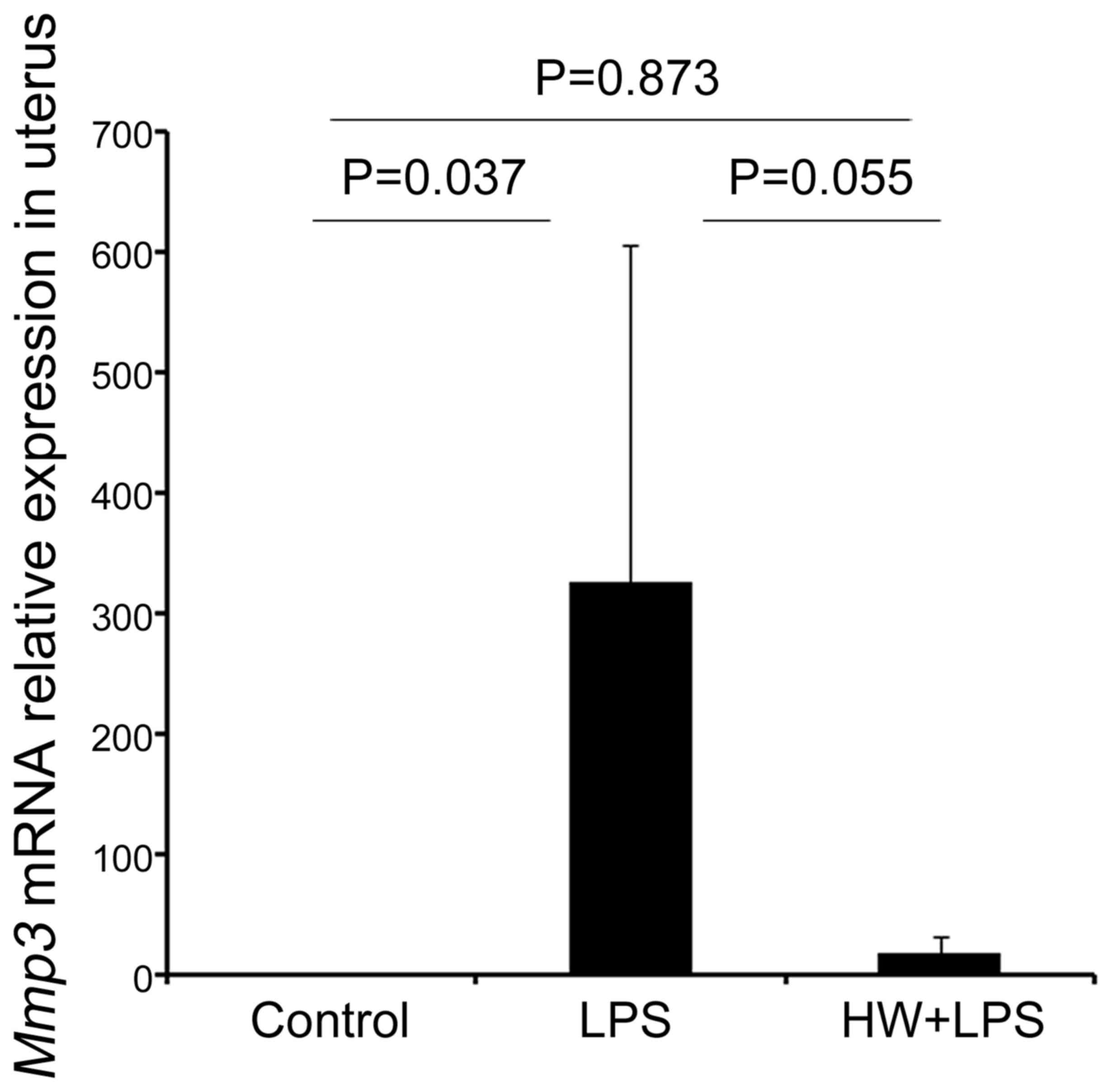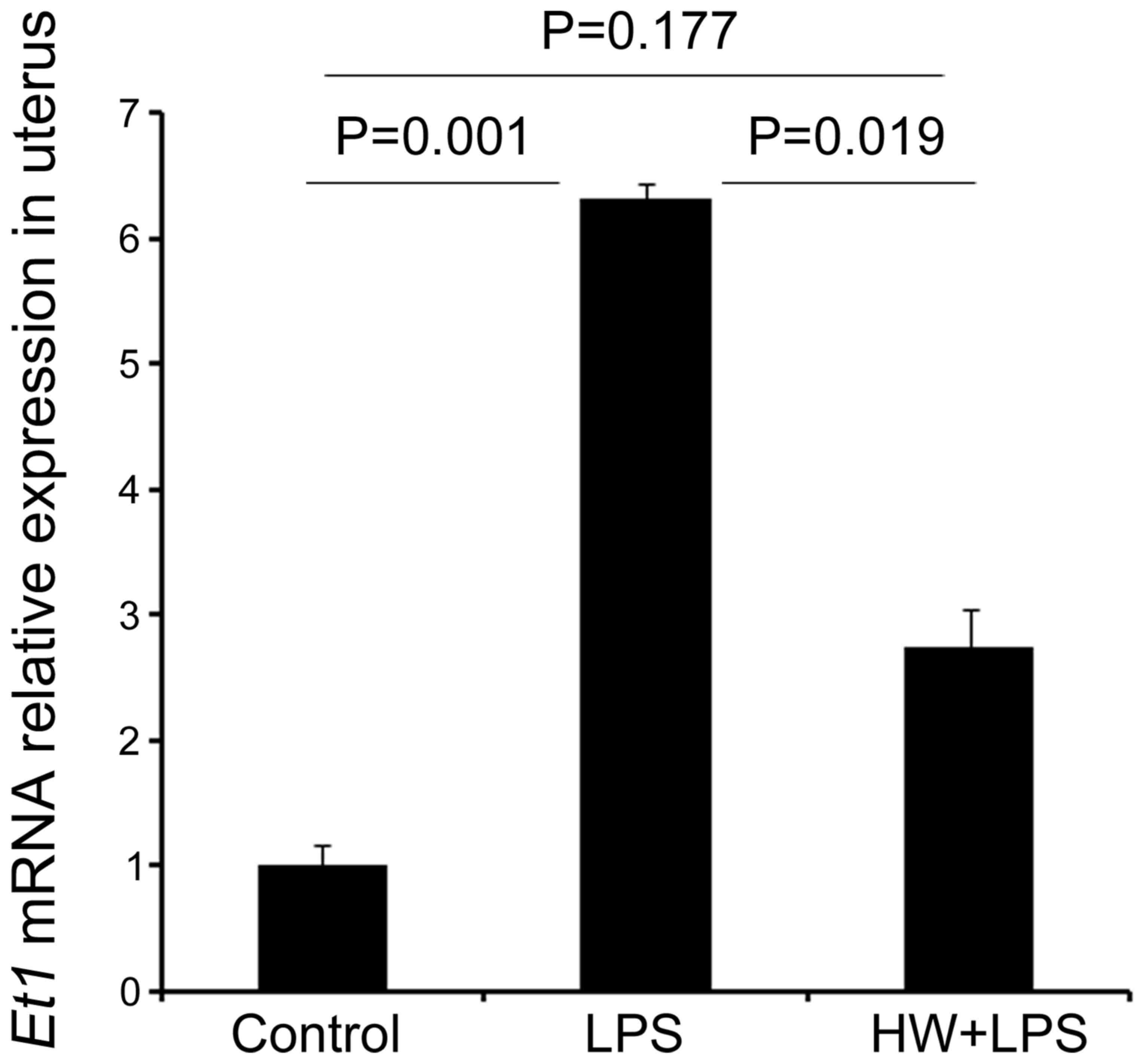|
1
|
Liu L, Oza S, Hogan D, Chu Y, Perin J, Zhu
J, Lawn JE, Cousens S, Mathers C and Black RE: Global, regional,
and national causes of under-5 mortality in 2000–15: An updated
systematic analysis with implications for the sustainable
development goals. Lancet. 388:3027–3035. 2016. View Article : Google Scholar : PubMed/NCBI
|
|
2
|
Boyle AK, Rinaldi SF, Norman JE and Stock
SJ: Preterm birth: Inflammation, fetal injury and treatment
strategies. J Reprod Immunol. 119:62–66. 2017. View Article : Google Scholar : PubMed/NCBI
|
|
3
|
Kim CJ, Romero R, Chaemsaithong P,
Chaiyasit N, Yoon BH and Kim YM: Acute chorioamnionitis and
funisitis: Definition, pathologic features, and clinical
significance. Am J Obstet Gynecol. 213 Suppl:S29–S52. 2015.
View Article : Google Scholar : PubMed/NCBI
|
|
4
|
Chau V, McFadden DE, Poskitt KJ and Miller
SP: Chorioamnionitis in the pathogenesis of brain injury in preterm
infants. Clin Perinatol. 41:83–103. 2014. View Article : Google Scholar : PubMed/NCBI
|
|
5
|
Keelan JA and Newnham JP: Editorial:
Advances in the prevention and treatment of inflammation-associated
preterm birth. Front Immunol. 7:2642016. View Article : Google Scholar : PubMed/NCBI
|
|
6
|
Ichihara M, Sobue S, Ito M, Ito M,
Hirayama M and Ohno K: Beneficial biological effects and the
underlying mechanisms of molecular hydrogen - comprehensive review
of 321 original articles. Med Gas Res. 5:122015. View Article : Google Scholar : PubMed/NCBI
|
|
7
|
Hattori Y, Kotani T, Tsuda H, Mano Y, Tu
L, Li H, Hirako S, Ushida T, Imai K, Nakano T, et al: Maternal
molecular hydrogen treatment attenuates lipopolysaccharide-induced
rat fetal lung injury. Free Radic Res. 49:1026–1037. 2015.
View Article : Google Scholar : PubMed/NCBI
|
|
8
|
Imai K, Kotani T, Tsuda H, Mano Y, Nakano
T, Ushida T, Li H, Miki R, Sumigama S, Iwase A, et al:
Neuroprotective potential of molecular hydrogen against perinatal
brain injury via suppression of activated microglia. Free Radic
Biol Med. 91:154–163. 2016. View Article : Google Scholar : PubMed/NCBI
|
|
9
|
Nakano T, Kotani T, Mano Y, Tsuda H, Imai
K, Ushida T, Li H, Miki R, Sumigama S, Sato Y, et al: Maternal
molecular hydrogen administration on lipopolysaccharide-induced
mouse fetal brain injury. J Clin Biochem Nutr. 57:178–182. 2015.
View Article : Google Scholar : PubMed/NCBI
|
|
10
|
Ohsawa I, Ishikawa M, Takahashi K,
Watanabe M, Nishimaki K, Yamagata K, Katsura K, Katayama Y, Asoh S
and Ohta S: Hydrogen acts as a therapeutic antioxidant by
selectively reducing cytotoxic oxygen radicals. Nat Med.
13:688–694. 2007. View
Article : Google Scholar : PubMed/NCBI
|
|
11
|
Iuchi K, Imoto A, Kamimura N, Nishimaki K,
Ichimiya H, Yokota T and Ohta S: Molecular hydrogen regulates gene
expression by modifying the free radical chain reaction-dependent
generation of oxidized phospholipid mediators. Sci Rep.
6:189712016. View Article : Google Scholar : PubMed/NCBI
|
|
12
|
Herington JL, Swale DR, Brown N, Shelton
EL, Choi H, Williams CH, Hong CC, Paria BC, Denton JS and Reese J:
High-throughput screening of myometrial calcium-mobilization to
identify modulators of uterine contractility. PLoS One.
10:e01432432015. View Article : Google Scholar : PubMed/NCBI
|
|
13
|
Nakashima-Kamimura N, Mori T, Ohsawa I,
Asoh S and Ohta S: Molecular hydrogen alleviates nephrotoxicity
induced by an anti-cancer drug cisplatin without compromising
anti-tumor activity in mice. Cancer Chemother Pharmacol.
64:753–761. 2009. View Article : Google Scholar : PubMed/NCBI
|
|
14
|
Rinaldi SF, Catalano RD, Wade J, Rossi AG
and Norman JE: Decidual neutrophil infiltration is not required for
preterm birth in a mouse model of infection-induced preterm labor.
J Immunol. 192:2315–2325. 2014. View Article : Google Scholar : PubMed/NCBI
|
|
15
|
Larionov A, Krause A and Miller W: A
standard curve based method for relative real time PCR data
processing. BMC Bioinformatics. 6:622005. View Article : Google Scholar : PubMed/NCBI
|
|
16
|
Sivarajasingam SP, Imami N and Johnson MR:
Myometrial cytokines and their role in the onset of labour. J
Endocrinol. 231:R101–R119. 2016. View Article : Google Scholar : PubMed/NCBI
|
|
17
|
Sehringer B, Schäfer WR, Wetzka B, Deppert
WR, Brunner-Spahr R, Benedek E and Zahradnik HP: Formation of
proinflammatory cytokines in human term myometrium is stimulated by
lipopolysaccharide but not by corticotropin-releasing hormone. J
Clin Endocrinol Metab. 85:4859–4865. 2000. View Article : Google Scholar : PubMed/NCBI
|
|
18
|
Romero R, Nicolaides KH, Conde-Agudelo A,
O'Brien JM, Cetingoz E, Da Fonseca E, Creasy GW and Hassan SS:
Vaginal progesterone decreases preterm birth ≤ 34 weeks of
gestation in women with a singleton pregnancy and a short cervix:
An updated meta-analysis including data from the OPPTIMUM study.
Ultrasound Obstet Gynecol. 48:308–317. 2016. View Article : Google Scholar : PubMed/NCBI
|
|
19
|
Aisemberg J, Vercelli CA, Bariani MV,
Billi SC, Wolfson ML and Franchi AM: Progesterone is essential for
protecting against LPS-induced pregnancy loss. LIF as a potential
mediator of the anti-inflammatory effect of progesterone. PLoS One.
8:e561612013. View Article : Google Scholar : PubMed/NCBI
|
|
20
|
Yang S, Li W, Challis JR, Reid G, Kim SO
and Bocking AD: Probiotic Lactobacillus rhamnosus GR-1
supernatant prevents lipopolysaccharide-induced preterm birth and
reduces inflammation in pregnant CD-1 mice. Am J Obstet Gynecol.
211:44.e1–44.e12. 2014. View Article : Google Scholar
|
|
21
|
Filipovich Y, Klein J, Zhou Y and Hirsch
E: Maternal and fetal roles in bacterially induced preterm labor in
the mouse. Am J Obstet Gynecol. 214:386.e1–386.e9. 2016. View Article : Google Scholar
|
|
22
|
Cook JL, Zaragoza DB, Sung DH and Olson
DM: Expression of myometrial activation and stimulation genes in a
mouse model of preterm labor: Myometrial activation, stimulation,
and preterm labor. Endocrinology. 141:1718–1728. 2000. View Article : Google Scholar : PubMed/NCBI
|
|
23
|
Fuchs AR, Fuchs F, Husslein P and Soloff
MS: Oxytocin receptors in the human uterus during pregnancy and
parturition. Am J Obstet Gynecol. 150:734–741. 1984. View Article : Google Scholar : PubMed/NCBI
|
|
24
|
van Vliet EOG, Nijman TAJ, Schuit E, Heida
KY, Opmeer BC, Kok M, Gyselaers W, Porath MM, Woiski M, Bax CJ, et
al: Nifedipine versus atosiban for threatened preterm birth
(APOSTEL III): A multicentre, randomised controlled trial. Lancet.
387:2117–2124. 2016. View Article : Google Scholar : PubMed/NCBI
|
|
25
|
Mitsuya K, Singh N, Sooranna SR, Johnson
MR and Myatt L: Epigenetics of human myometrium: DNA methylation of
genes encoding contraction-associated proteins in term and preterm
labor. Biol Reprod. 90:982014. View Article : Google Scholar : PubMed/NCBI
|
|
26
|
Chow L and Lye SJ: Expression of the gap
junction protein connexin-43 is increased in the human myometrium
toward term and with the onset of labor. Am J Obstet Gynecol.
170:788–795. 1994. View Article : Google Scholar : PubMed/NCBI
|
|
27
|
Chang EY, Zhang J, Sullivan S, Newman R
and Singh I: N-acetylcysteine attenuates the maternal and fetal
proinflammatory response to intrauterine LPS injection in an animal
model for preterm birth and brain injury. J Matern Fetal Neonatal
Med. 24:732–740. 2011. View Article : Google Scholar : PubMed/NCBI
|
|
28
|
O'Brien M, O'Shaughnessy D, Ahamide E,
Morrison JJ and Smith TJ: Differential expression of the
metalloproteinase MMP3 and the alpha5 integrin subunit in human
myometrium at labour. Mol Hum Reprod. 13:655–661. 2007. View Article : Google Scholar : PubMed/NCBI
|
|
29
|
Watari M, Watari H, Nachamkin I and
Strauss JF III: Lipopolysaccharide induces expression of genes
encoding pro-inflammatory cytokines and the elastin-degrading
enzyme, cathepsin S, in human cervical smooth-muscle cells. J Soc
Gynecol Investig. 7:190–198. 2000. View Article : Google Scholar : PubMed/NCBI
|
|
30
|
Nakayama K, Otsuki K, Yakuwa K, Hasegawa
A, Sawada M, Mitsukawa K, Chiba H, Nagatsuka M and Okai T:
Recombinant human lactoferrin inhibits matrix metalloproteinase
(MMP-2, MMP-3, and MMP-9) activity in a rabbit preterm delivery
model. J Obstet Gynaecol Res. 34:931–934. 2008.PubMed/NCBI
|
|
31
|
Breuiller-Fouché M, Morinière C, Dallot E,
Oger S, Rebourcet R, Cabrol D and Leroy MJ: Regulation of the
endothelin/endothelin receptor system by interleukin-1{beta} in
human myometrial cells. Endocrinology. 146:4878–4886. 2005.
View Article : Google Scholar : PubMed/NCBI
|
|
32
|
Romero R, Avila C, Edwin SS and Mitchell
MD: Endothelin-1,2 levels are increased in the amniotic fluid of
women with preterm labor and microbial invasion of the amniotic
cavity. Am J Obstet Gynecol. 166:95–99. 1992. View Article : Google Scholar : PubMed/NCBI
|
|
33
|
Wang W, Yen H, Chen CH, Soni R, Jasani N,
Sylvestre G and Reznik SE: The endothelin-converting
enzyme-1/endothelin-1 pathway plays a critical role in
inflammation-associated premature delivery in a mouse model. Am J
Pathol. 173:1077–1084. 2008. View Article : Google Scholar : PubMed/NCBI
|
|
34
|
Kim CJ, Romero R, Chaemsaithong P and Kim
JS: Chronic inflammation of the placenta: Definition,
classification, pathogenesis, and clinical significance. Am J
Obstet Gynecol. 213:S53–S69. 2015. View Article : Google Scholar : PubMed/NCBI
|















